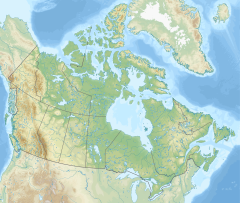Boas River
| Boas River | |
|---|---|
| Location | |
| Country | Canada |
| Territory | Nunavut |
| Physical characteristics | |
| Source | |
| • coordinates | 63°43′0″N 85°44′59″W / 63.71667°N 85.74972°W |
| Mouth | |
• location | Bay of Gods Mercy, Nunavut |
• elevation | 0 m (0 ft) |
- Boas River is also a name for the Çoruh River in northeast Anatolia.
The Boas is a river on Southampton Island in Nunavut, Canada. The river rises at 64°49′58″N 084°23′34″W / 64.83278°N 84.39278°W and its mouth is located at the Bay of Gods Mercy. Proceeding inland, the river becomes braided and is about 5 kilometres (3.1 mi) wide.[1]
It is named after anthropologist Franz Boas.[2]
Flora
There are rich sedge meadows in the river's 2 mi (3.2 km)-wide delta area.[3]
Fauna
Bearded seal, bowhead whale, harbor seal, narwhal, polar bear, ringed seal, walrus, and white whale frequent the area.[1]
Boas River and associated wetlands is a Canadian Important Bird Area, site #NU022 (63°45′N 85°40′W / 63.75°N 85.66°W). The elevation varies from 0 m (0 ft) to 60 m (200 ft) above sea level. The IBA is 5,402 km2 (2,086 sq mi) in size. The Harry Gibbons Migratory Bird Sanctuary encompasses one third of the IBA's western portion.[1]
This is a notable breeding area for the lesser snow goose. Other bird species include: American golden plover, Arctic loon, Atlantic brant, Canada goose, herring gull, jaegers, king eider, Lapland longspur, oldsquaw, red phalarope, red-throated loon, Ross's goose, tundra swan, sandhill crane, semipalmated plover, semipalmated sandpiper, and white-rumped sandpiper.[1]
History
The area was populated by Sadlermiut until the early 20th century when they were wiped out by an epidemic.[2]
See also
References
- ^ a b c d "Boas River and associated wetlands". bsc-eoc.org. Archived from the original on 2011-06-12. Retrieved 2009-04-23.
- ^ a b Johnsgard, Paul A.; Paul Geraghty (1979). Song of the north wind: a story of the snow goose. U of Nebraska Press. pp. 10. ISBN 0-8032-7552-8.
franz boas boas river.
- ^ Barry, Thomas W. (April 1956). "Observations of a Nesting Colony of American Brant". The Auk. 73 (2). unm.edu: 193–202. doi:10.2307/4081471. JSTOR 4081471.


